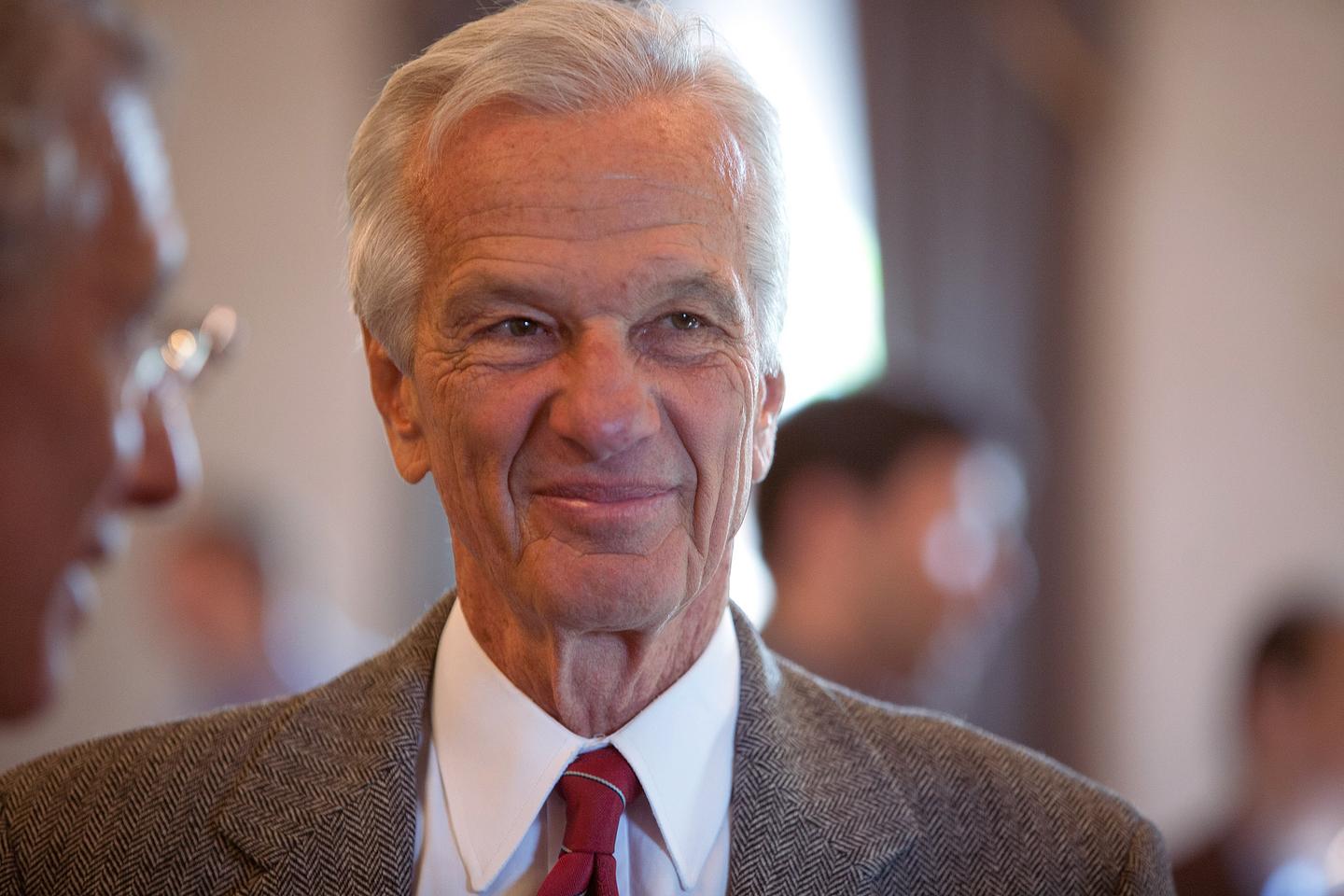
A gift from Jorge Paulo Lemann ’61 will support the creation of new curricular offerings and expanding current courses that focus on innovation and entrepreneurship.
Photo by Susan Young
Making a difference 101
Alumnus gift supercharges new coursework on innovation and entrepreneurship
Harvard undergraduates aspiring to be the world’s next change agents will soon have even more ways to learn how. Thanks to a recent gift from Brazilian investor Jorge Paulo Lemann ’61, Harvard is creating new curricular offerings and expanding current courses that focus on areas of innovation and entrepreneurship. The fund enables Harvard College, the Harvard John A. Paulson School for Engineering and Applied Sciences (SEAS), and Harvard Business School (HBS) to expand their collaboration on interdisciplinary courses in experiential learning, engineering, design, and systems thinking.
Courses that build entrepreneurial mindsets are increasingly popular with undergraduates. “ES96 was the class that gave me the motivation to be innovative,” said Taci Pereira ’17 of “Engineering Problem-Solving and Design,” where students have been challenged to create anything from NASA flight instruments that measure ozone levels in the stratosphere to web applications that provide details on the acoustical characteristics of SEAS classrooms for the hard of hearing.
“In the class, you work for a ‘client’ and are presented with a real problem to fix,” said Pereira. Her class was tasked with helping to improve the workflow at Harvard’s Office of Environmental Health and Safety using technology. They designed a voice-controlled label printer to help the group more safely dispose of hazardous materials.
Pereira followed this experience with a course on tissue engineering taught by David Mooney, Robert P. Pinkas Family Professor of Bioengineering, and wrote her senior thesis on creating biomaterial for cancer immunotherapy. She now spends her days at a 3-D bioprinting company in Philadelphia, which aspires to be among the first to print tissues and organs that researchers can use to test new drug therapies.
“These courses really prepared me to be at a startup and to do the kind of research that has potential to address serious issues, like finding a cure for cancer,” says Pereira.
Other Harvard undergraduates are first exposed to real-world problem-solving through courses such as “Entrepreneurship and Venture Capital in the Global Economy,” which offers a hands-on look at what it takes to launch a new business, with regular trips to the Harvard i-lab and visits with local startups.
Renan Ferreirinha Carneiro ’17 remembers this class being an especially formative start to his Harvard experience. “The case study methodology was so interesting, and we heard from so many guest speakers in business,” he says. “That class showed me how to speak the language of a startup and how to inspire people to support a new project.”
“Jorge Paulo Lemann’s support will help Harvard prepare our students to take the lead in solving our most intractable challenges beyond disciplinary lines.”
Rakesh Khurana, Danoff Dean of Harvard College
Carneiro took what he learned there, as well as in classes on economics, government, and Latin culture, to create two social movement coalitions on education and political advocacy: Mapa Educação and Acredito. He has returned to his native Brazil, where he oversees the two organizations, and hopes to one day run for elective office.
Both students were supported by Lemann, who also funds undergraduate financial aid. But they are just two of the many undergraduates from across the world who are eager to take what they learn in the classroom and make a real difference.
“Jorge Paulo Lemann’s support will help Harvard prepare our students to take the lead in solving our most intractable challenges beyond disciplinary lines,” said Rakesh Khurana, Danoff Dean of Harvard College and Marvin Bower Professor of Leadership Development at Harvard Business School. “We are challenging our faculty to create new coursework that meets the needs of today’s students.”
To help facilitate the curricular expansion, Harvard College will invite faculty across the College, SEAS, and HBS to propose and develop new courses related to innovation and entrepreneurship through a competitive proposal process. Plans are to create a pilot of eight to 12 new courses, ranging from smaller seminars to larger, lecture-based classes. The effort also complements development underway for the new General Education Program, slated for launch next year.
Lemann’s gift also established a permanent faculty position, the Jorge Paulo Lemann ’61 Professor of Practice, to be filled by a scholar who can further curricular development and focus on developing courses that bring enterprise thinking to the classroom.
“We are grateful for the assistance this gift will provide to recruit experienced instructors to our faculty and to increase our course offerings,” said Frank Doyle, SEAS dean. “Lemann’s support will help us expand our curriculum in innovation and entrepreneurship at a time when engineering at Harvard is experiencing an unprecedented surge in student interest.”
Lemann has long dedicated philanthropy to Harvard. The Lemann Foundation, a family charitable organization, has supported expanded financial aid to undergraduate and graduate students from Brazil, provided resources for visiting faculty, and launched the Brazil Research Fund, a high-level research collaborative between Brazilian and Harvard faculty.
“I’m proud to help Harvard students from all areas of the globe learn how to be future entrepreneurs,” said Lemann. “Business and innovation is what makes the world such a dynamic place, and I am excited to see what Harvard students will accomplish next.”




